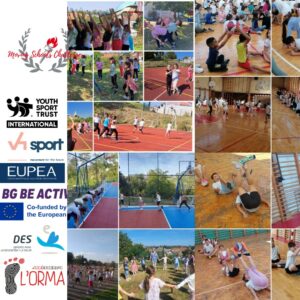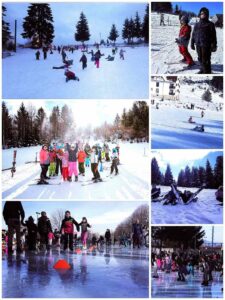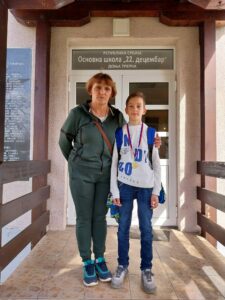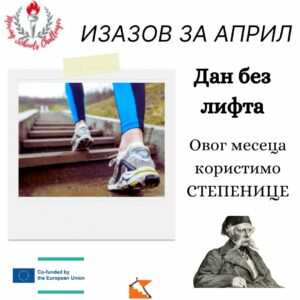Moving Schools Challenger (MSC)
MSC is focused on promoting Physical Activity and Healthy Lifestyles in a regular daily base to all students. Objective is to set a pan-European program for the whole school year with the main objective to promote healthy lifestyles: active and healthy kids and active and healthy teachers and families.
ONE CHALLENGE A MONTH
All European schools currently participating in the MSC project have to achieve Healthy Kilometres (HKms) completing some monthly non-competitive challenges such as participating to European School Sport Day in September, organizing some active breaks in October, re-imagine school facilities, school gym or other indoor spaces in the school as new and safe Active Spaces in November and so on until April with #NoElevatorDay challenge.
The project not only aims to help children become more physically active and healthy, it will also have a positive impact on teachers and families for example when in February students have to promote movement and connection between generations organizing some physical activity with relatives and especially grandparents. Schools also get connected with other schools as they get to know who is participating and they can interact between them.

September Challenge: schools have to participate to European School Sport Day to earn Healthy Kilometers (HK). European School Sports Day (ESSD) is celebrated every last Friday of September. Each year is focused on a theme (e.g. Joy in sport and physical activity – year 2023). The schools are trying to be active and healthy during this month organizing an event where students, school staff and families can have fun through sport and physical activity.

October Challenge: schools have to participate to Celebrating Autumn (School sport, jump, dance, enjoy) to earn Healthy Kilometers. During this month active breaks, active playgrounds, eat fruit and increase water intake can help to earn HKms. Zombie Dance and Rope Skipping became very popular on October in MSC schools.

November Challenge: schools have to use the power of spaces to promote physical activity and try to be active also in their surroundings to earn HKms. Students, teachers, parents should re-imagine school facilities, school gym, other indoor spaces such as corridors, stairs, schoolyards, open-air facilities as new and safe Active Spaces.

December Challenge: This month all students will accumulate HKms depending on how much they were active during winter holidays. Before holidays each student will receive a simple recording chart where he/she will write down the sport activities performed each day of the holidays. Upon returning from the break, each students will add together HKms with students of the other classes participating in the project.

January Challenge: in this month students will earn HKms doing sport or sport activities that can be done mostly in winter. Skiing, sleigh, ice skating, snowboarding, ice-hockey, indoor curling and also building a snowman, hiking out in nature, walking with all family will be useful for HKms. Take also in account that learning about Winter Olympics or studying healthy daily life habits or know more about correct nutrition can increase the number of HKms.

February Challenge: in this month students can earn HKms doing sport or physical activities with their own families. The idea is to use the power of games to promote movement and connection between generations.It is generally agreed that intergenerational connection have positive effects on both young and elderly people, such as preventing loneliness, reducing depression, and improving self-esteem. Taking a walk or hike with grandparents after school or at the weekend, learning a traditional game from grandparents, planning activities with school staff for an active visit to the local care home could all be wonderful ideas to collect HKms.


March challenge: This month’ s topic corresponds with the Sport #WithoutWaste movement so students have to learn green habits in order to collect HKms. As children spend most of their time at school, environmental education should be an integral part of the school curriculum. When it comes to raising awareness, simple things we do at school can make a difference and contribute to environmental conservation. Therefore, it is important that students are involved in separate collection activities, waste disposal, and recycling through purposefully planned activities.

April challenge: This month’ s challenge coincides with the global initiative No Elevators Day (24th April) so the benefits of climbing stairs will be HKms.Avoiding lifts or elevators, when is possible, highlights a simple way to add physical activity to our daily lives. #UseTheStairs will help students to burn calories and contribute to a healthier, more active planet that fights against sedentary lifestyles and obesity.

To have more info about this EUPEA project visit the website: https://www.movingschools.eu/

Disclaimer: Project is funded by the European Union. Views and opinions expressed are however those of the author(s) only and do not necessarily reflect those of the European Union or the European Education and Culture Executive Agency (EACEA). Neither the European Union nor EACEA can be held responsible for them.